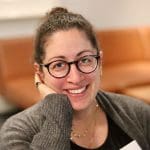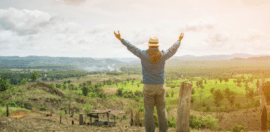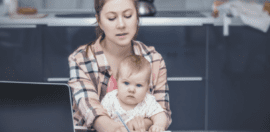Want to work in Aboriginal spaces? The more the merrier!

7 July 2022 at 2:26 pm
Djap Wurrung and Gunditjmara woman Sheree Lowe has spent her life working in community, across the community-controlled, government and private sectors. She is this week’s Changemaker.
Sheree Lowe describes her career trajectory as “a little bit different”.
She is currently the executive director of social and emotional well-being at the Victorian Aboriginal Community Controlled Health Organisation (VACCHO). But her first role was working in home and community care, where she would take care of Elders and older people in community who required some extra support doing things like shopping, cleaning and going to appointments.
“I have a deep passion for the importance of education, so I worked in a few roles in the education space and continue to advocate and volunteer in this space,” she explains.
“I have worked in consultancy for over 10 years and now I’m back in the Aboriginal community-controlled sector.”
She explains that all roles vary, her passion for these roles lies in two key factors: working with and engaging with community, and working with non-Aboriginal people to “understand us and to work with us, not try to change us or get us to fit in to a structure but how the structures need to change for us to see ourselves within them”.
In this week’s Changemaker, Sheree Lowe discusses developing her career across Aboriginal organisations and encourages more people to get involved.
How did you get into the job you’re in now?
In consulting, which is what I had done previously for several years, you get to know a little about a lot of different things and work with a range of different people, but you often don’t get to see the project through from start to finish.
I started to think about my contribution back to my Victorian community and how and what I can do to make a significant change. I started out in the community-controlled sector and have worked in government, private sector and want to finish off in our Aboriginal community-controlled sector.
Our relationships and way of doing things is very reciprocal and it is now time for me to give back to community and in particular honour and continue the work of our Elders and leaders.
The rest of this story is fairly straightforward; the role was advertised, I applied and have been in the role for almost 12 months.
What does a typical day look like for you?
Hectic. I start most days around 5:30am and hit the road to commute to the office by about 6am. We are in the midst of the Victorian Mental Health Reform so in any one day I could be talking about funding reform, cultural safety, Aboriginal measures of success, advocacy around alcohol and other drug services, mental health services, the list goes on. Then I hit the road back to regional Victoria, spend a couple of hours with my family (which includes a few dogs, goats, chooks and sheep) and do it all again the next day.
What advice do you have for both Aboriginal and non-Aboriginal people wanting to work in this sector?
Yes please. Jump in. The more the better. For Aboriginal people working with our mob to improve their social and emotional wellbeing can be taxing, at times exhausting, but also really rewarding – and if you are mob and keen in this space, please reach out to me.
For our allies in this space, in health and wellbeing in particular, also social and emotional wellbeing, engage in learning and development that builds your understanding of trauma from an Aboriginal lens. The willingness to be agile but most importantly to stop and listen deeply and ask questions.
What does NAIDOC Week mean to you and how has your NAIDOC Week been?
I love everything about NAIDOC Week. I have spent time celebrating Blak Excellence at the National NAIDOC awards, spent time on Country immersed in culture and celebrating with family, and marched on Friday, as our family have done for many years. This is an important part of our NAIDOC week to continue to stand up and walk in solidarity of our brothers, sisters and allies against the injustices to our people but also to be seen and to be heard; we have survived.
There are 52 weeks in the year and I am grateful that Aboriginal and Torres Strait Islander events, culture and histories are acknowledged. We do however need to think more deeply as a country about how we move forward as a nation; that our voices, knowledge, stories are recognised and celebrated. We are still a long way from this but there are positive steps forward.
What are some of the challenges working in the NFP sector generally and the Aboriginal justice space specifically?
From my perspective the biggest challenge from my end is centred around systemic change. This is a critical part of us moving forward. Honouring Aboriginal ways of knowing, being and doing and what that looks like in a contemporary western system. I am working currently in health and wellbeing but this applies to many different sectors. The change we require to improve lives for our people needs a real openness to doing things differently.
But some specific challenges include limited resources, working with systems that don’t allow the flexibility to work in a self-determined manner, and working with people who have limited knowledge about the hidden histories of Australia and the impact on Aboriginal people. You can often feel like you are the one voice up against so many.
What is your proudest achievement?
There are many. My two children Tarni (21) and Elias (19) make me proud everyday and would make our Elders sing. Being strong in identity and taking opportunities as they cross their paths. Our Elders fought hard for the opportunities we are seeing today. They prepared the foundation and planted the seeds of opportunity that we see today.
From a work perspective, I’m proud of the Balit Durn Durn Centre. This is the Centre of Excellence in Aboriginal Social and Emotional Wellbeing that we launched in May 2022. It’s leading reform in Aboriginal social and emotional wellbeing at VACCHO.
I’m also proud of the Australian Health Practitioner Regulation Agency (AHPRA) cultural safety program. It designs and delivers a bespoke cultural safety program for all staff within AHPRA. This program was critical to helping address racism in the Australian health system and responding in a culturally safe way.
What do you do when you’re not at work?
I am always working. If it is not my paid role, it is volunteering in a couple of different community groups I am passionate about. But also the fun stuff – spending time with family, I love exploring food and wines, and enjoy getting away from the hustle and bustle although these times are few and far between.







